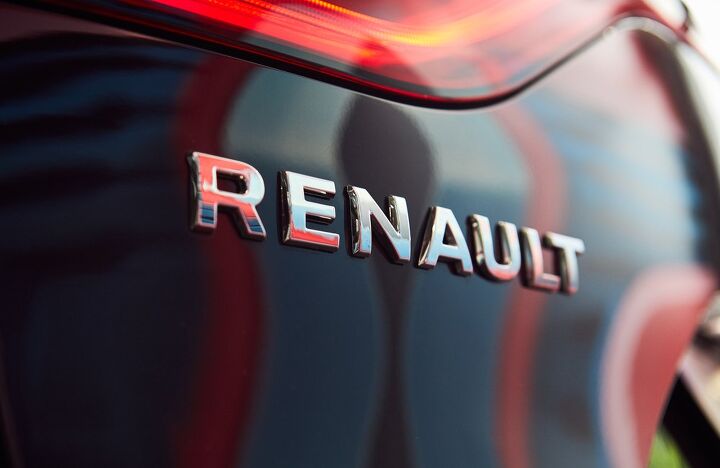Report: Renault Considering Separate EV Business, IPO for Assets

Renault SA is reportedly mulling over the possibility of undergoing extensive restructuring, followed by an initial public offering for its electric vehicle assets. While the company had hinted that splitting itself into separate EV and combustion brands was a possibility in February, it wasn’t taken all that seriously. At the time, numerous automakers had suggested dividing themselves along similar lines.
But Ford Motor Co. announced it would actually be going ahead with the plan in March and Renault appears to be similarly warming to the idea, based on a meeting held last week between upper-level management and analysts. This included CEO Luca de Meo and CFO Thierry Pieton, both of whom allegedly acknowledged the real possibility of a split at the French automaker and the subsequent IPO.
“The management team continues to conduct exploratory works in view to split the company into possibly two entities,” Stifel analysts including Pierre Quemener wrote in a note shared by Bloomberg.
One of those businesses was said to be the EV-focused “New Mobility” utilizing assets from Renault’s Mobilize Share car-rental service, which will be separated from its legacy assets.
“The CEO [Luca de Meo] added that the latter could be combined with the ones of a potential partner,” the note continued. “An IPO of New Mobility assets could be contemplated for 2023.”
Renault Group’s previously suggested Mobilize could serve as the foundation for a new vehicle division dedicated to “shared mobility and the mobility of the future.” The abstract revolves around the premise of small EVs utilizing “shared ownership experiences” that would reduce downtime. While Renault presented this as a way to minimize CO2 emissions and help meet Europe’s goal of carbon neutrality by 2040, it quickly got into the weeds when it started making assertions about how this might also help maximize residual value somehow. Releases likewise mention concepts like circular economies and abandoning ownership in favor of advancing the goods-as-a-service trend — something any consumer advocate should probably be vehemently against.
The company even introduced the EZ-1 prototype microcar to help advance the premise, comparing it to the Twizy quadricycle as if that was going to whet everyone’s apatite an envisioned future of never owning your own vehicle. The EV-1 is effectively a permanent rental where customers are required to sync with their smartphones. The vehicle is perpetually connected to the internet, allowing Renault to charge based on mileage and time spent inside the cabin. It’s a concept we’ve seen floated dozens of times before and it never gets any easier to swallow, especially now that some of the largest car-sharing firms have been consistently retreating from numerous markets after a few years of explosive growth.
Renault’s being tight-lipped about this new, prospective plan, so it’s not clear how (or if) Mobilize is going to change. The language being used by the analysis makes it sound as though Mobilize Share is being dismantled to make way for an entirely new EV division. But the automaker’s decision to stick with mobility monikers makes me wonder if it will simply be another attempt to push ride-sharing onto the public. The industry cannot help but keep talking about this stuff, presumably because manufacturers believe they make a fortune turning vehicle owners into permanent renters.
Of course, this is assuming there’s even a concrete plan for EVs in place at this juncture. The French automaker does have other, much bigger problems to contend with and they may be taking precedence — starting with AvtoVAZ.
From Bloomberg:
The possibility of a deep overhaul of Renault is emerging just as the company faces a crisis surrounding its longstanding business in Russia. Renault last month signaled a retreat from its second-largest market by halting operations at its Moscow plant and saying it’s assessing available options for its AvtoVaz venture that makes the country’s top selling Lada brand.
A move to split the company would serve not only to deflect from a costly pullout from Russia, but also to raise funds for development of EVs and technology. Renault cut its forecasts for group operating margin and automotive operating free cash flow, citing the suspension of its business in Russia.
Renault shares fell as much as 0.9 [percent] at the start of trading Tuesday, taking losses since Russia invaded Ukraine to around 24 [percent].
But the company had been discussing the possibility of reorganization ahead of any formal invasions that took place. During a February 18th earnings announcement, the automaker suggested splitting the business so it had a division wholly dedicated to electric vehicles and introducing an array of services.
“Renault is studying the opportunity to bring together its 100 [percent] electric activities and technologies within a dedicated entity in France to accelerate their growth,” read the statement. “At the same time, Renault Group is also studying the opportunity to bring together its activities and technologies of [internal combustion] and hybrid engines and transmissions based outside of France within a dedicated entity.”
This seems highly similar to Ford Motor Co’s decision to create the Model E unit it plans to have focused on all-electric models. While Blue Oval has been somewhat hesitant to overtly push the concept of shared ownership, the unit has been tasked with developing new software and connected-vehicle technologies and services. Meanwhile, other brands have been pretty open about how the transition to EVs would mean changing what future vehicle ownership actually entails. However, as lucrative as that business model might be, it’s a big risk for any company to have wrapped up in their legacy business — perhaps explaining the desire to separate the two.
[Images: Bondart Photography/Shutterstock; Renault]

A staunch consumer advocate tracking industry trends and regulation. Before joining TTAC, Matt spent a decade working for marketing and research firms based in NYC. Clients included several of the world’s largest automakers, global tire brands, and aftermarket part suppliers. Dissatisfied with the corporate world and resentful of having to wear suits everyday, he pivoted to writing about cars. Since then, that man has become an ardent supporter of the right-to-repair movement, been interviewed on the auto industry by national radio broadcasts, driven more rental cars than anyone ever should, participated in amateur rallying events, and received the requisite minimum training as sanctioned by the SCCA. Handy with a wrench, Matt grew up surrounded by Detroit auto workers and managed to get a pizza delivery job before he was legally eligible. He later found himself driving box trucks through Manhattan, guaranteeing future sympathy for actual truckers. He continues to conduct research pertaining to the automotive sector as an independent contractor and has since moved back to his native Michigan, closer to where the cars are born. A contrarian, Matt claims to prefer understeer — stating that front and all-wheel drive vehicles cater best to his driving style.
More by Matt Posky
Latest Car Reviews
Read moreLatest Product Reviews
Read moreRecent Comments
- RHD The analyses above are on the nose.It's a hell of a good car, but the mileage is reaching the point where things that should have worn out a long time ago, and didn't, will, such as the alternator, starter, exhaust system, PS pump, and so on. The interiors tend to be the first thing to show wear, other than the tires, of course. The price is too high for a car that probably has less than a hundred thousand miles left in it without major repairs. A complete inspection is warranted, of course, and then a lower offer based on what it needs. Ten grand for any 18-year-old car is a pretty good chunk of change. It would be a very enjoyable, ride, though.
- Fred I would get the Acura RDX, to replace my Honda HR-V. Both it and the CRV seats are uncomfortable on longer trips.
- RHD Now that the negative Nellies have chimed in...A reasonably priced electric car would be a huge hit. There has to be an easy way to plug it in at home, in addition to the obvious relatively trickle charge via an extension cord. Price it under 30K, preferably under 25K, with a 200 mile range and you have a hit on your hands. This would be perfect for a teenager going to high school or a medium-range commuter. Imagine something like a Kia Soul, Ford Ranger, Honda CR-V, Chevy Malibu or even a Civic that costs a small fraction to fuel up compared to gasoline. Imagine not having to pay your wife's Chevron card bill every month (then try to get her off of Starbuck's and mani-pedi habits). One car is not the solution to every case imaginable. But would it be a market success? Abso-friggin-lutely. And TTAC missed today's announcement of the new Mini Aceman, which, unfortunately, will be sold only in China. It's an EV, so it's relevant to this particular article/question.
- Ajla It would. Although if future EVs prove relatively indifferent to prior owner habits that makes me more likely to go used.
- 28-Cars-Later One of the biggest reasons not to purchase an EV that I hear is...that they just all around suck for almost every use case imaginable.



































Comments
Join the conversation
"manufacturers believe they make a fortune turning vehicle owners into permanent renters" Maybe in the country of Europe, but in the US car ownership is a Constitutional right. Renault seems to have no plan, and announcing it that way is embarrassing. How can anyone have confidence in Renault's leadership as they wring their hands?
"... As I was sayeeeng, at ze end of ze day, we steel own ahl ze cahrs. Eeet is, how you say, like ze landownairs and ze sharecroppairs?"